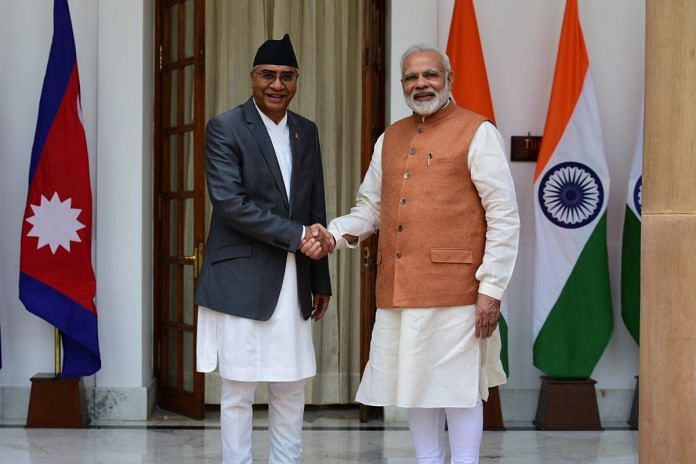The new Nepal PM has promised a lot during his visit here. But given the political scenario at home he’s unlikely to fulfill them.
The day after he returned from his five-day visit to India, Nepal’s Prime Minister Sher Bahadur Deuba had to stand up in parliament and clarify that he had done no wrong in New Delhi. Then, he offered the clichéd line that comprehensive talks were held on all aspects of bilateral relationship in an atmosphere of goodwill and trust.
A fissile mixture of xenophobia, chauvinism and jingoism invariably greets a Nepalese PM whenever he returns from New Delhi. Before embarking on his Indian journey, Deuba had been asked by nationalist-press in Kathmandu to do the impossible: Open up fresh debate over controversial border issues on India-China-Nepal tri-junction in the north-west of the country. In the middle of the Doklam standoff, it would have been improper for a visiting Nepalese PM to foist a long dormant claim upon his hosts.
The other demand from them was even more impractical: nationalists in Nepal insist that the Indo-Nepal Treaty of Peace and Friendship of 1950 be revised. Despite serious concerns over excluding Madheshis and Janjatis in the Eminent Persons’ Group on Nepal-India Relations (EPGNIR), the group is already working on recommendations for a revision of the treaty. But without their report, Deuba could not have raised the issue in a credible manner.
Deuba was asked not to enter into any agreements on water resources. But lacking a two-thirds majority in parliament for necessary endorsement, he would do no such thing anyway.
Other than mouthing platitudes, there was little that Deuba could have done to ink pacts for further cooperation in exploiting water resources or control flooding in the Ganga plains for mutual benefit.
Perhaps the timing of Deuba’s first visit abroad was inappropriate. But he was following a historical convention. Since the nineteenth century, competing nobles of the Kathmandu Court typically looked to the East India Company for legitimacy. And it has been somewhat of a tradition for Nepalese Prime Ministers to look for an official Indian invite to visit. Deuba too was under pressure to make a trip to New Delhi within 100 days of assuming office.
An Indian invite to visit New Delhi is interpreted as a sign that the incumbent of Baluwatar, the official residence of Prime Minister of Nepal, enjoys the confidence of South Block. That’s a dilemma every Nepalese Prime Minister has to grapple with while embarking upon a journey southwards: India’s largesse is the main source of all its hopes but it can’t be said in public for fear of being branded anti-national by the Kathmandu press.
While still on the Indian soil, Deuba announced that fresh attempts will be made to amend the controversial constitution. Deuba knows that promises to right a wrong can be no more than pious declarations with no attendant obligation to fulfill them. However, the monarchists, Marxists and Maoists banded together to pounce upon him at the airport itself for raising an internal matter in a foreign capital. Maoists are his coalition partners in the government, but they have been even more vocal than the opposition in slamming the PM.
Even though a junior partner, Maoist Supremo Pushpa Kamal Dahal aka Prachand holds the government by the scruff of its neck. Prachanda’s public outbursts may simply be meant to obtain a larger share in the resources of the government. However, rumours are rife in Kathmandu that Prachanda has been prevailed upon by his Chinese interlocutors to re-fashion a communist coalition with Communist Party of Nepal (United Marxist-Leninist) before the parliamentary elections that are scheduled to be held before the end of the year.
It’s not easy to correctly gauge the real intent of the game of Chinese whispers that Nepalese politicians love to play, but considering the fact that most rumors about change of government in Kathmandu turn out to be true sooner than later, it’s difficult to be sanguine about Deuba’s fourth attempt at running a shaky government.
Inside his own Nepali Congress party, Chairman Deuba courted controversy by nominating his longtime loyalist Bimalendra Nidhi as the Working President. This decision brought his competitors in the party—the dynastic Koirala clan—together. Performance of the party in the third face of local election scheduled for late-September will test the resilience of Deuba’s leadership within the party.
The general talk in Kathmandu is that New Delhi wants the current coalition to survive at least until fresh polls to keep CPN (UML) out of power. The Chinese want their favorites—the nationalist communists of UML and Maoists—to work together and oust what is perceived to be a pro-West government under Nepali Congress leadership.
In Nepalese politics, chequebook interventions can work wonders, and that’s an area where the Chinese have bigger resources. Beijing is no longer hesitant about using its influence in shaping public opinion and ensuring favorable outcomes in Nepal’s political contests.
Should the government change again in Kathmandu before the year-end; Indian Prime Minister Narendra Modi probably will not be too surprised. Since he hosted Sushil Koirala at his swearing-in ceremony in May 2014, he has already met with three new successive Nepalese Prime Ministers. Each one of them made promises in New Delhi with full knowledge that they will not be able to keep them once back home.
The Indian patronage for a Nepalese PM is often perceived to be a kiss of death at home. Will Deuba prove the perception wrong when he completes eight months in office – which has been the average longevity of Prime Ministers after the promulgation of the controversial statute?
C.K. Lal is a Kathmandu-based columnist and commentator. Twitter: @CKlal_Archive



